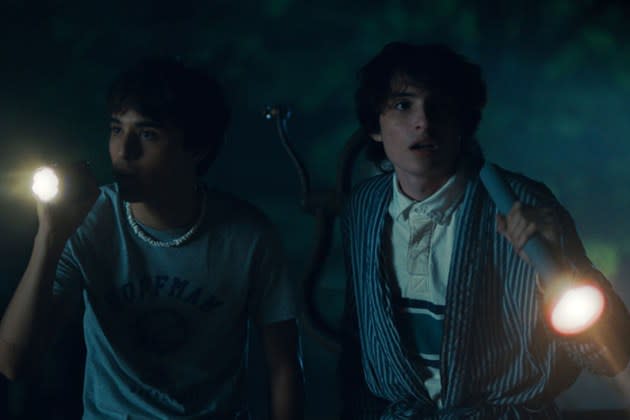‘Hell of a Summer’ Review: Finn Wolfhard’s Summer Camp Slasher Film Is Limp as Horror but Likable as Comedy

At 24 years-old, Jason Hochberg (Fred Hechinger) is officially too old to be into summer camp. But he passes up a law internship anyway to come to Camp Pineway and be a counselor one last time. Once Jason arrives, he’s not only the oldest counselor there; he’s immediately ostracized for his childlike eagerness toward camp activities. The rest of the counselors mainly have flirting and partying in mind.
Bobby (Billy Bryk) wants girls to like him, but he tries too hard and turns them off. Chris (Finn Wolfhard) already has a thing with Shannon (Krista Nazaire), but they’re hiding it from Bobby. Mike (D’Pharaoh Woon-A-Tai) and Demi (Pardis Saremi) are a stereotypically gorgeous couple. The rest of the teens fit easily into high-school comedy archetypes — Ezra (Matthew Finlan) is queer and loves theater, Ari (Daniel Gravelle) is the self-serious film buff, Miley (Julia Doyle) is the self-righteous vegan and Noelle (Julia Lalonde) is the goth girl obsessed with the afterlife. Despite their differences, they all have one thing in common: an immediate dislike of Jason and his earnest love of the camp.
More from The Hollywood Reporter
European Directors Back Agnieszka Holland Amid Polish Government Attacks
'Wicked Little Letters' Review: Olivia Colman and Jessie Buckley Reunite in Strained Period Comedy
Toronto Awards Analysis: 'American Fiction' Oscar Contender Status Cemented by Audience Award
But Jason has an ally in Claire (Abby Quinn), who is the only girl who doesn’t find his childlike optimism off-putting. When counselors start getting picked off one by one, Claire is the only person who doesn’t suspect Jason. She obviously has a crush on him, but he’s too distracted by his love of the camp to really notice until the murders force them to work together.
Making Jason the main suspect is Hell of a Summer’s most interesting narrative decision, highlighting the stunted nature of prolonged adolescence. There are moments when he looks at the camp wistfully, realizing his time there is up. But then, right before he hits a breakthrough, he tumbles back into denial, fantasizing about working for the camp full-time instead of going to law school. Hechinger has a strange energy that makes Jason seem unpredictable enough to remain a suspect, even after showing real concern for his fellow counselors.
Wolfhard and Bryk are debuting co-writer/directors here, and it’s difficult to make a first feature. Technical issues can be unavoidable. Hell of a Summer indeed suffers from not having enough coverage, scenes not being properly lit and an editing style that has a tendency to undercut the jokes. The young cast is a bit awkward, not fully comfortable with the emotional demands required of the later scenes. But the style of humor is childishly delightful, with Bryk a standout. His journey from being frustrated that girls don’t like him to being hurt that the killer isn’t interested in him is the strongest joke in the film.
Unfortunately, the mystery of the killer fizzles out quicker than it should, even if the results are narratively satisfying. The twist is by far the most daring part of the narrative, really locking the characters into place for a fun third act. But despite the best efforts of the directors, Hell of a Summer just isn’t scary. Bryk and Wolfhard know how to tell jokes, but struggle with establishing a truly creepy atmosphere.
Hell of a Summer feels like a film made by a group of young friends, all much more interested in the experience of making it than trying to do something subversive with the story itself. The stakes are high but feel low, and many of the kills don’t get enough time or the proper framing to really sink in. And yet there’s a kindness to the film toward adolescence, in stark contrast to the slashers we know that punish teens for having a good time. Even as the kids are getting picked off here, fun still feels like the desired goal when all the trauma is over.
The biggest problem with Hell of a Summer is that there’s really not much to say about it. Watching it is like being in a freshman film class in which the professor is asking everyone to come up with detailed notes on how to improve the film. But making a film is still an achievement in itself, paving the way for more polished work in the future. Maybe it’s enough that Hell of a Summer leaves us eagerly wondering what Bryk and Wolfhard will make next.
Best of The Hollywood Reporter

 Yahoo News
Yahoo News 